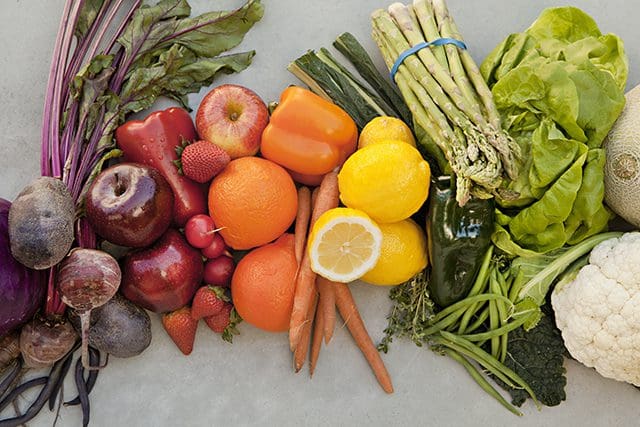A farmers market can be a great place to buy food, but it can be troublesome if you don’t know what to buy, or if you buy too much. Time and time again I have walked into kitchens only to see formerly beautiful whole foods rotting in bowls, drawers, and bags. Be a conscious consumer while shopping for food, especially at the farmer’s market, and only buy the items you need. Your kitchen will thank you for it.
Fresh fruit and produce from a farmers market are often a better and cheaper alternative to grocery store products. Yet without the proper information to maneuver the market you may find yourself with produce that are no better than what’s on your grocery store shelves, and may in fact spoil sooner. I always encourage clients to eat organic and buy local, and luckily with growing trends and an increasing demand, farmers markets and organic foods are widely available.
After you have found a good farmers market, its time to pick out your produce. Buy the best fruits and vegetables you can find: fresh, loaded with vitamins and minerals, and great tasting. Here are a few common questions (and answers) to help you find the best fruit at a farmers market:
1. How can I tell if a vegetable is New or Old?
Check to see how heavy the vegetable is; a heavier vegetable will be fresher than a lighter one because vegetables lose water over time, and thus become lighter as they get older.
2. How can I pick out the best tasting vegetable?
Smaller fruit or vegetables will have more flavor and absolutely smell it. It should smell like what it is.
3. How do you pick out vegetables?
You should buy vegetables that are firm, and without indents, wrinkles, or bruises (avocados are an exception). Their color should be bright and not dull.
Tip: Use all of your senses: Taste – Take a bite if you can, (grapes, small tomatoes, etc. if they offer samples) you don’t want to buy something that doesn’t taste good. Smell – Always smell what you are going to buy. It should actually smell like the fruit or vegetable. If it doesn’t have a smell or it has a bad odor, stay away from it. Touch – Make sure every vegetable you buy is firm and not too mushy (even tomatoes or avocados won’t last in your kitchen if they are too mushy) Hear – Ok so obviously you’re not going to do this to all vegetables, but you can tap on some, such as melons or large squashes and listen for a nice solid sound. If it sounds hollow then it probably has lost a lot of water, and you should pick another
Questions to ask at a farmers market.
Though farmers markets have a reputation for fresh food, how do you know that your farmers market is a better option than your local grocery store? Ask questions and make an educated decision based on the answers the vendors give you. Here are a few questions to ask, and the reasons to ask them.
Is the market certified?
Answer: The state designs certifications that require farmers markets to abide by certain guidelines to keep food safe (Not all states have certification). Certification is important to a farmers market’s credibility. (not all states require certification)
Where is the certification posted?
Answer – A letter of certification should be visible somewhere in the market. If you are not certain you can call and verify with the state.
If it’s not a certified farmers market, (and they do exist) – Check to see who grew the food- the farmer or seller?
Answer – Without certification you want to purchase food directly from the farmer that grew it, not an independent distributor. The farmer can tell you exactly what’s going on with his produce.
If the farmer/vendor did not grow the produce they are selling, where does it come from?
Answer – If the produce was not grown from that farmer/vendor, the produce should at least be locally grown.
Is the produce they are selling in your area in season?
Answer – Avoid produce/food that is out of season, because it probably came from far away. Food out of season will be more expensive, and may not taste as good.
Is the farmer certified organic?
Answer – Farmers work hard to become certified, so they are proud to show you their certification. Organic food costs more so make sure they are legitimate growers.
If they are not organic certified but they follow a lot of the guidelines ask how often they use pesticides.
Answer – You want a farmer that sprays occasionally rather than regularly.
Which produce are they spraying with pesticides and chemicals?
Answer – Some produce absorbs pesticides and chemicals more than others. For example: strawberries have tons of pores and absorb the pesticides and chemicals more than other fruits and vegetables that should be organic (i.e. berries, potatoes, carrots).
Which foods are selling for the best price?
Answer – Vendors and farmers know the best buys, so they can help you make the right choice. Create a relationship with the vendor to ensure you will purchase the best foods.
Which produce tastes the best right now?
Answer – Again, vendors and farmers will know and they are willing to help you. Ask for a sample if you are unsure.
Bottom line – ask if you are not sure about something.
Use these answers to ask yourself, “Do I want to buy this produce?”
Note: *All states are different and there are no nationwide regulations or certification.
